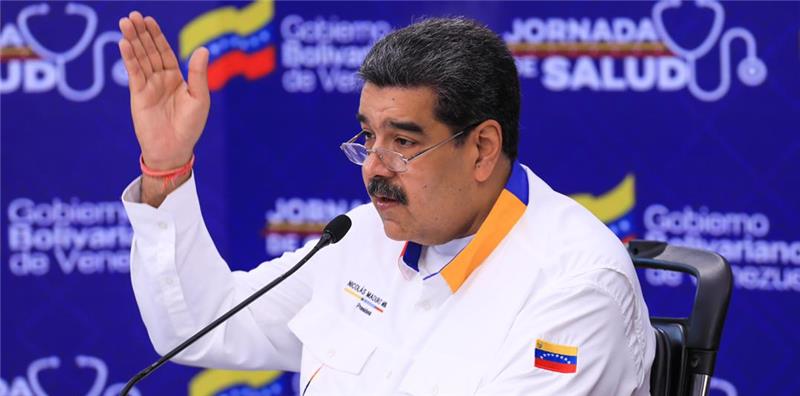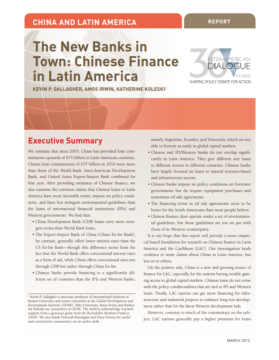Hugo Stay Home
Hugo Chavez, the Venezuelan president, has clearly been enticed by the Libyan drama, where his longtime friend and ally, Muammar al-Qaddafi, is under siege from rebel forces.
A Daily Publication of The Dialogue
Venezuela’s ruling party-controlled National Assembly on May 4 named two opposition leaders as election officials, a move that some analysts see as President Nicolás Maduro's latest conciliatory signal to the administration of U.S. President Joe Biden. Other actions included granting house arrest to six U.S. citizens known as the “Citgo 6” and allowing the U.N. World Food Program back into the country. However, an unnamed White House official told Reuters that the administration needed to see “concrete actions” before changing its policy toward Venezuela. How significant are the Maduro government’s recent moves, and are they likely to lead to real change in Venezuela? What influence does the Venezuelan opposition have both in public and behind the scenes, and what factions within the opposition are playing the most important roles at this moment? What “concrete” measures by Maduro does the Biden administration want to see, and to what extent can it leverage the Venezuelan government’s latest steps to push for even more compromises before easing sanctions or shifting strategies?
Luis Almagro, secretary general of the Organization of American States: “A common error is referring to the illegitimate National Assembly as Venezuela’s ruling party-controlled National Assembly. The Permanent Council resolution of Dec. 10, 2020 rejected the fraudulent election of Dec. 6. The legitimate National Assembly is the institution elected in 2015. The so-called ‘conciliatory signals’ from the regime such as the designation of an illegitimate National Electoral Council are not significant or conducive to the restoration of democracy and justice in Venezuela. These recent moves only show the dictatorship’s determination to toy with the international community and trick it into thinking that it is acting in good faith. This sort of action is not new. The dictatorship has made similar moves leading to a dozen previous dialogue processes. What is necessary is strong leadership from all pro-democracy and pro-human rights domestic and international actors and continued pressure on the regime. Significant moves would be releasing all political prisoners and stopping political persecution and the use of torture; holding free and fair presidential, parliamentary and regional elections with the participation of international election observation; adopting a comprehensive electoral reform; moving toward achieving justice for crimes against humanity and gross human rights violations; and allowing into the country international humanitarian aid that Venezuelans desperately need. In the short run, it is essential that the democratic international community continue to support and work closely with the Guaidó interim government, as well as all democratic forces in the country. Supporting the legitimate National Assembly—the only democratic element that remains in the country—and calling for the adoption of an independent National Electoral Council should be a common, shared strategy of the pro-democracy international community. In the long run, the international community should learn and transition from common errors to common strategies when facing serious regional crises.”
Vanessa Neumann, former Juan Guaidó-appointed Venezuelan ambassador to the United Kingdom: “Maduro’s recent moves are all about heightening his legitimacy, both to try to access international markets and funds and to sideline Guaidó. Maduro’s deep loathing of all things Guaidó was evidenced when Maduro blew up the Covax negotiation that was supposed to be a confidence-building measure toward a broader negotiation for transition. Instead, Maduro tried to go it alone with vaccine suppliers, and it was only when that failed that he came back to the Covax table, allowed in the World Food Program and made the moves now being hailed as ‘positive.’ The inclusion of two opposition members in the new electoral commission is deeply problematic for Guaidó, whose international leadership was born of the fraudulent 2018 presidential elections. The upcoming regional elections put Guaidó and Voluntad Popular in serious jeopardy. All indications are that Primero Justicia and Acción Democrática will go to the elections, leaving Guaidó to face a grim choice. The 2015 National Assembly over which Guaidó had presided is out of constitutional mandate, leaving his political base nearly as questionable as Maduro’s. However, if Guaidó runs for the regionals, he will effectively admit that he is one more opposition politician and not interim president. Voluntad Popular does not have the political infrastructure to win big in regional elections, even if they were not rigged under the regime. Maduro will always cheat and bully. International partners must ensure that any ‘positive moves’ are toward the goal of comprehensive reform that gets Venezuela to free and fair elections, which the dictatorship has no reason to accept unless its international masters tell it to. While it would be a moral and strategic failure not to keep herding Maduro toward the exit, the path to Venezuelan democracy will still be long and complicated. A new opposition will rise from the political ashes sooner rather than later.”
Gregory Meeks, U.S. congressman (D-N.Y.) and chairman of the House Foreign Affairs Committee: “While President Maduro’s recent moves will not by themselves bring an end to the conflict, I believe that these gestures from Caracas send a signal to Washington that there’s a willingness to open conversations toward reaching a negotiated solution in Venezuela. The formation of Venezuela’s new National Electoral Council leaves a lot to be desired, but it’s important that we don’t lose sight of the fact that this is the first time since 2006 that two of five election officials on the council are from the opposition. It is also notable that many of the recent actions Maduro has taken have been a result of pressure by an increasingly organized civil society coalition that is taking shape in Venezuela. While the Biden administration should continue engaging with the Guaidó-led alliance, it is also necessary to recognize that there is a fractured opposition in Venezuela, and other leaders such as Henrique Capriles must be considered. It is important to remember that the only person who benefits from a fractured opposition is Nicolás Maduro. Unfortunately, former President Trump’s ‘maximum-pressure’ policy on Venezuela has failed. Now is the time for the Biden administration to make sure all voices of the opposition have a seat at the table. As the Biden administration rightfully continues to pressure Maduro to end crackdowns on civil society and legalize opposition parties, it must also consider restoring permits to allow Venezuela to swap crude oil for diesel. We cannot let this window of opportunity close.”
Marco Rubio, U.S. senator (R-Fla.): “The Maduro narco-regime has failed to negotiate in good faith in the past and continues to prolong the agony of the Venezuelan people as it grasps onto its illegitimate power. The chosen members of the National Electoral Council (CNE) lack legitimacy and international validity. We must remain firm in our support of credible negotiations led by Interim President Juan Guaidó and the democratically elected National Assembly, which include clear conditions that represent the interests of Venezuelan civil society and the best solution to the Venezuelan crisis.”
Alejandro Velasco, associate professor at New York University: “On the surface, these latest moves appear minor: the Citgo 6 could return to jail, the United Nations could be kicked out and the CNE remains a majority pro-government body. But after years of deepening authoritarianism, humanitarian crisis and frozen diplomacy, they represent clear, if fraught and tentative, steps toward a scenario in which Venezuelans themselves decide their future via free and fair elections. The question is: why now? Certainly, Maduro wants sanctions relief. But the reality is that these moves come from a position of strength, not weakness, by the government. It’s clear that Trump’s ‘maximum pressure’ strategy harmed no one less than Maduro, who found ways and partners to remain in power and outlast both Trump and the Juan Guaidó-led opposition. Moreover, some Trump sanctions—on diesel fuel and oil for food, for instance—backfired, harming everyday Venezuelans far more than Maduro, while undermining opposition credibility at home. The United States now faces a three-fold challenge. Any sanctions relief will incur wrath from opposition hardliners in the United States and elsewhere. But that is a manageable concern, and statements from U.S. officials suggest the Biden administration is willing—as it should—for the opposition itself to determine how to proceed rather than dictate strategy. A second challenge is that by refusing even minimal sanctions relief, the Biden administration will signal it has no intention of actually changing Trump-era policies despite rhetoric to the contrary, helping extend Venezuelans’ suffering. The third and bigger challenge, however, is that any sanctions relief, coupled with continued opposition chaos, may help lay the groundwork for the unthinkable: free and fair elections that chavismo actually wins as the economy recovers and voters see no credible alternative. But that is a risk the United States should take, if its commitment to a democratic outcome is genuine.”
Phil Gunson, senior analyst for the Andes region at International Crisis Group: “The opposition is now better represented on the elections board than at any time in the past 17 years. Its two principal board members combined possess enormous political and technical experience and have already reached some important agreements. In order to restore confidence in the electoral system, the Maduro government must allow these measures to be implemented in full: opposition parties must be able to compete under their rightful leaderships, voter rolls must be comprehensively updated, and opposition experts must be allowed to conduct a comprehensive revision of election hardware and software, among other conditions. Genuinely competitive elections held at the national level are a prerequisite for ending Venezuela’s crisis, and the first test comes next year with a potential recall referendum against the president. The new appointments to the CNE strengthen the hands of those who, like former presidential candidate Henrique Capriles, believe partial, ad hoc agreements between the government and the opposition can work, and that competing even in unfair elections is better than the all-or-nothing approach that Juan Guaidó, whom the United States recognizes as Venezuela’s legitimate president, insists on. But all opposition factions agree that a comprehensive agreement between the two sides will be needed if a sustainable transition is to occur. Washington should respond to the signals Maduro is sending with measures to provide modest sanctions relief that can be reversed if there is backsliding. And it should establish effective channels of communication with Caracas that allow the two governments to gauge each other’s intent and communicate their own.”
 The Latin America Advisor features Q&A from leaders in politics, economics, and finance every business day. It is available to members of the Dialogue’s Corporate Program and others by subscription.
The Latin America Advisor features Q&A from leaders in politics, economics, and finance every business day. It is available to members of the Dialogue’s Corporate Program and others by subscription.
Hugo Chavez, the Venezuelan president, has clearly been enticed by the Libyan drama, where his longtime friend and ally, Muammar al-Qaddafi, is under siege from rebel forces.
Estimates of the volume, composition, and characteristics of Chinese lending to the region since 2005.
Is the Venezuelan government likely to comply with the IACHR’s ruling or will it uphold the ban?
 Several recent actions by Venezuelan President Nicolás Maduro have been seen as conciliatory. // File Photo: @NicolasMaduro via Twitter.
Several recent actions by Venezuelan President Nicolás Maduro have been seen as conciliatory. // File Photo: @NicolasMaduro via Twitter.
